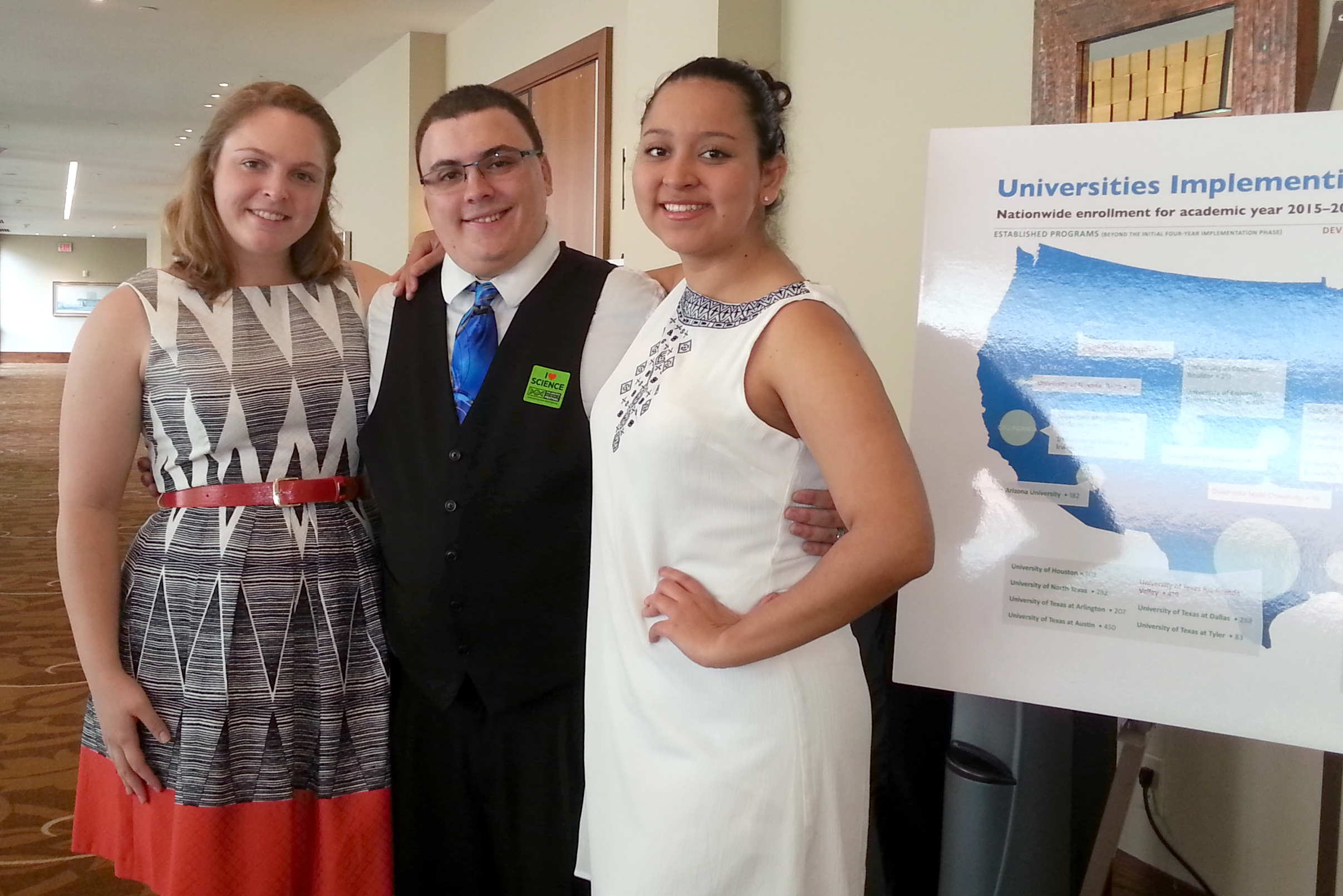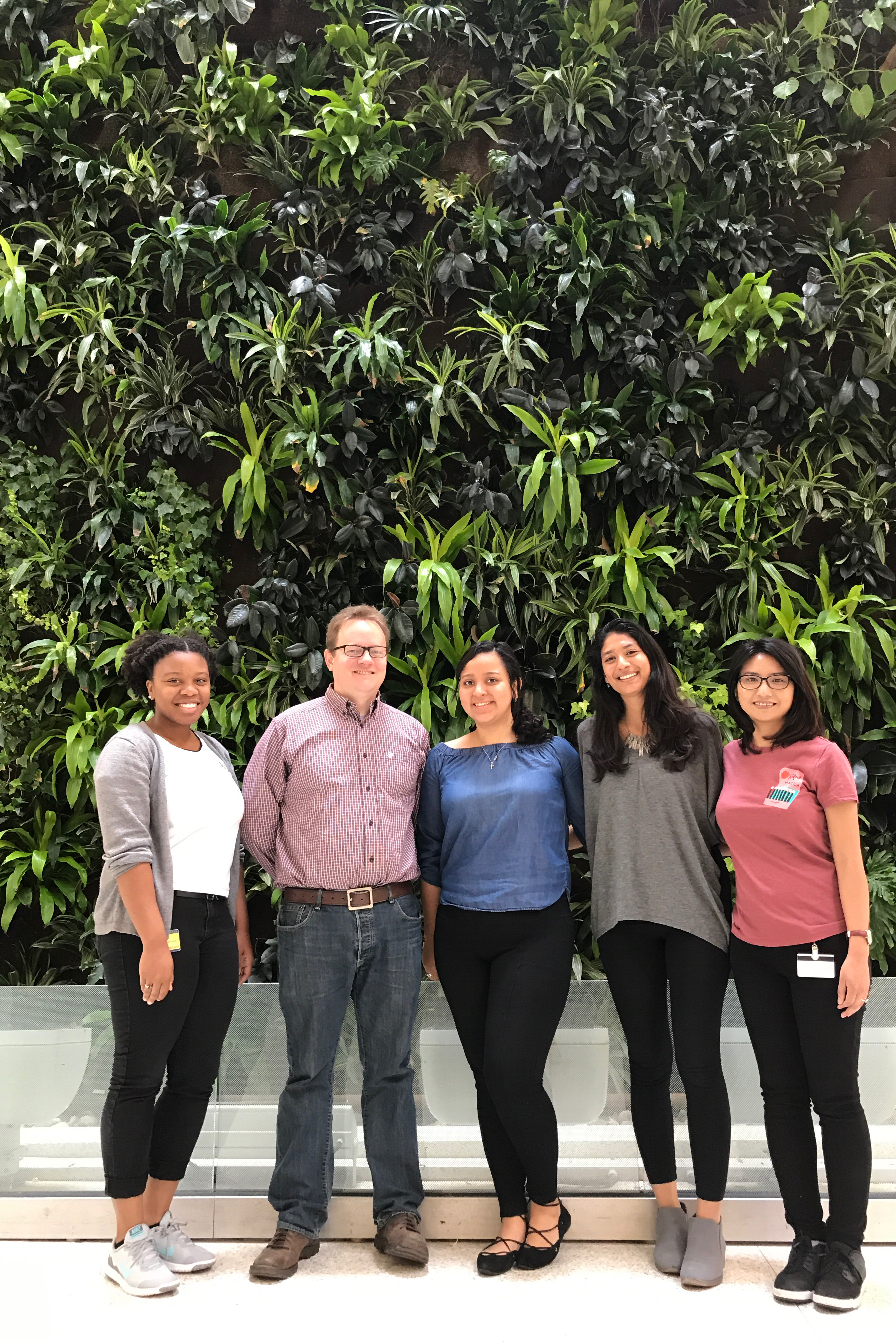From Cs to PhD: International Student Overcomes Obstacles to Excel in Biology Research and Education
By Kylie Gray
June 13, 2018
 Nicole Naranjo (right) and her DragonsTeach peers at the UTeach conference in Austin, Texas
Nicole Naranjo (right) and her DragonsTeach peers at the UTeach conference in Austin, Texas
When Nicole Naranjo takes her seat on stage at the Drexel University College of Arts and Sciences Commencement, she will be accompanied by her teacher Angel Garcia from the Centro Educativo Bilingue Interamericano in Ecuador. Naranjo nominated Garcia for the Harold W. Pote “Behind Every Graduate” award, a Drexel initiative to acknowledge inspiring high school teachers with an expenses-paid trip to the ceremonies.
Naranjo's family will also travel from Ecuador to cheer her on as she accepts her bachelor’s degree in biological sciences, poised to take on cancer research and a competitive PhD program in genomics at Thomas Jefferson University. It is a fitting way to celebrate not only her academic and research achievements at Drexel, but also her ability to overcome obstacles as an international student.
From a Shaky Start to a Second Home at Drexel
The daughter of a neurologist and a pediatrician, Naranjo always knew that she would one day leave Ecuador to pursue higher education in the United States. She had attended a bilingual school since age three, spoke fluent English at 10, and at 18 was valedictorian of her high school class. Even so, she says she was unprepared for the challenges that awaited her at Drexel.
“My first two years at Drexel were very hard. I understood the words in the textbook but not the context or certain idiomatic expressions. I would study for eight hours a day and still get Cs,” she says. “When my mom left me in the dorm for the first time, she told me, ‘I know you are going to shine here.’ But after two years, I thought, ‘I’m not shining.’ I was crushed.”
Along with new experiences — from her fascination with squirrels to her wonder at her first snowfall — came challenges that left her on the verge of dropping out.
“Having an accent, I felt like my intelligence was constantly being challenged, and it was hard to make friends. The language barrier didn’t allow me to be myself. I felt like a failure — like I wasn’t good enough to be here,” she says.
Everything changed for Naranjo when she found her fit in two on-campus groups: DragonsTeach, a teaching certification program for STEM majors, and the research lab of Ryan Petrie, PhD, assistant professor of biology. These groups would not only come to define her Drexel experience, but would also help her make sense of her experiences as an international student.
“DragonsTeach gave me a sense of belonging and became a second family. It helped me make American friends, communicate better and come out of my shell,” she says. “I learned that we as international students have a ‘silent period.’ I didn’t talk much at first because I was afraid of people making fun of my accent or thinking I was stupid. It’s important to tell international students that this, as well as the culture shock, is normal.”
Naranjo enrolled in her first DragonsTeach course as a sophomore and was soon teaching her own courses in an elementary school. After presenting at the national UTeach conference in Texas, she got a job as an assistant with DragonsTeach — a role she says enabled her to network with administrators and faculty in the Center for the Advancement of STEM Teaching and Learning Excellence (CASTLE).
It was through a CASTLE connection that she landed a research position in the lab of Ryan Petrie, PhD, a cell biologist who conducts basic research on intracellular pressure and cell movement. Naranjo had originally considered attending medical school, following in the footsteps of her mother, father and older brother, but turned her attention toward research following her co-op at the Children’s Hospital of Pennsylvania.
“My first term in the lab was mostly spent training on the microscopes and learning how to culture cells. Then I moved on to my first project,” she says. “Dr. Petrie was so patient, and he really shaped me as a scientist. He takes the time to meet with every one of his students and cares about them as people.”
A Future in Biology Research and Education
 Naranjo (center) with members of the Petrie Lab
Naranjo (center) with members of the Petrie Lab
Naranjo’s experiences in the Petrie lab convinced her to pursue a PhD in genetics, genomics and cancer biology — an especially impressive feat for international students, who are not eligible for certain types of research funding.
“Cancer research is a broad field that has a lot of life and is related to my research in the Petrie lab. I want to understand how cells move and metastasize,” she says. “I realized how great of a PI Dr. Petrie was during my graduate school interviews. Because of him, I was able to talk science.”
Naranjo’s decision to pursue a doctorate was also influenced by her passion for education. As she continued to excel in teaching throughout her time at Drexel — receiving a $2,000 co-op award and support from Drexel philanthropist Peggy Greenawalt for her student teaching co-op — she realized that her interests in education and biology could intertwine.
“I believe that we need to make a revolutionary change in education. In order for me to do that, I need to first be an expert in something and get a PhD. I hope to one day become a professor with knowledge of education and teaching techniques, or have a lab of my own and give students opportunities to learn science,” she says.
In May, Naranjo’s efforts as a student, employee, teaching assistant and researcher came to fruition as she received invitations to multiple PhD programs — ultimately choosing Jefferson to expand her network in the Philadelphia area.
Her mentor Petrie has high expectations for Naranjo’s career in graduate school, and believes that she will be a source of inspiration to her future trainees.
“As a result of Nicole’s research and intellectual independence, she helped to destroy a long-cherished hypothesis I brought to my new lab. Her work fundamentally changed how we think about the problem of how cells move. It is now the job of the next generation of Drexel undergraduates to roll up their sleeves and keep pushing Nicole's research forward,” he says.
With an even deeper appreciation for the value of education, Naranjo is proud to recognize one of her own educators at the College commencement and celebrate her accomplishments with the support of family, peers and mentors.
“So many people here have shown me their love and support, and have made my life very happy. I am proud to be a Drexel student. I didn’t know anything about biology, but here I became a cell biologist,” she says.